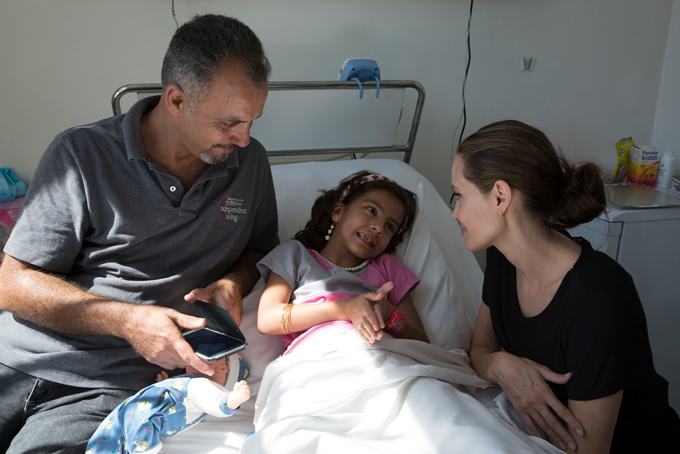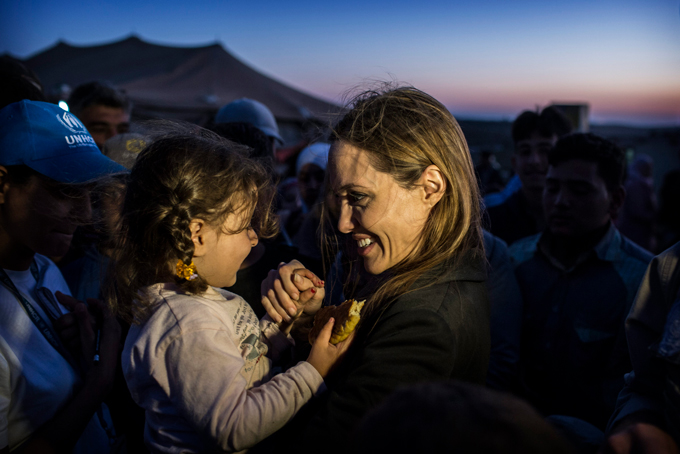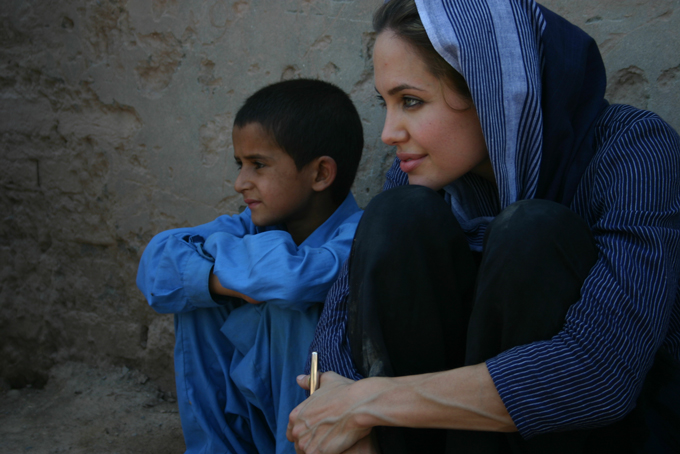As far as acting and filmmaking goes, Angelina Jolie has had some pretty enviable tutelage in her 45 years. Born to Hollywood royalty Jon Voight and the late Marcheline Bertrand, she studied at the prestigious Lee Strasberg Theatre and Film Institute before starring in the likes of 1999’s Girl, Interrupted—earning her an Academy Award for Best Supporting Actress in 2000—and Clint Eastwood’s Changeling (2008). Then, for her directorial debut 2011’s In the Land of Blood and Honey, about the Bosnian War, she sought only the most experienced collaborators—casting actors from the Balkans whom she encouraged to consult on the production and dialogue. But it’s perhaps her humanitarian work with refugees that’s taught her the greatest lessons of all.
“I found myself a student at their feet,” Jolie tells Vogue. “I have learned more from [refugees] about family, resilience, dignity and survival than I can express.” The mother of six has spent almost two decades working with the United Nations High Commissioner for Refugees (UNHCR), first as a goodwill ambassador and as of 2012, special envoy, in light of her dedication to the cause.
Jolie’s first mission was to Sierra Leone in the final years of the civil war that raged from 1991 to 2002. Since then, she has travelled to countries including Lebanon to meet Syrian refugee children, Iraqi Kurdistan to highlight the critical needs of 3.3 million internally displaced Iraqis, Thailand, where families from Myanmar are sheltering in refugee camps in the north of the country, and most recently Colombia, where more than 4 million Venezuelans are living in exile.

So what does the role of UNHCR special envoy entail? In addition to bringing much-needed attention to major crises that result in mass population displacements, Jolie represents the agency and commissioner at a diplomatic level. “My work now involves fighting alongside my colleagues for refugees to have rights and protection, to resist forced returns, and to push for better learning opportunities,” she explains. “UNHCR is a protection agency. We help those who have fled war and persecution, who’ve had their rights violated.”
We spoke to Jolie about her work with UNHCR and how it has transformed her perception of motherhood.
UNHCR’s raison d’être is to save lives, protect rights and build a better future for refugees. What is it about these causes that speak to you personally?
“I see all people as equal. I see the abuse and suffering and I cannot stand by. Around the world, people are fleeing gas attacks, rape, female genital mutilation, beatings, persecution, murder. They do not flee to improve their lives. They flee because they cannot survive otherwise.
“What I really want is to see an end to what forces people out of their homelands. I want to see prevention when we can, protection when needed and accountability when crimes are committed.”
According to UNHCR, the world now has a population of nearly 80 million forcibly displaced people—the highest on record. In your years working with UNHCR, you’ve witnessed the dramatic increase first hand. What have been the main causes?
“I see a lack of will to protect and defend basic human rights, and a lack of diplomacy and accountability. A lot of people profit from the chaos of broken, dependent countries and it sickens me. We also see leaders spread fear for political gain, and nationalism rising—anger at ‘the other’.
“But on the other hand, I also see amazing generosity towards refugees in many countries and extraordinary strength and resilience from refugees themselves. And it is not a hopeless picture. Just five conflicts account for two-thirds of all cross-border displacement—Syria, Venezuela, Afghanistan, South Sudan and Myanmar. Change the dynamic there, and we change the picture for global displacement.”

Before the pandemic, you were doing a lot of work in Venezuela and Bangladesh. Can you tell us about some of the things you witnessed there and what the situation is now?
“I saw people at their most human, who’ve been through unimaginable violence or hardship, and who are just trying to take care of their families. Any of us would do the same in their situation. Like all of us, they want to be safe, they want to have a home, and they want to be free.
“The realities for refugees or displaced people are extremely hard. They are often victims of rape and sexual abuse. They are struggling with the same kinds of illnesses you find in any community during peacetime, but without access to the healthcare you or I would be able to rely on.
“And then, refugees often live in tents in camps that are extremely exposed to the elements. Last month, refugees in Bangladesh were hit by a cyclone.”
Are there any regions or groups of people you are especially concerned about right now?
“I’m really worried about people in Yemen. They’ve had five years of brutal conflict. They’ve suffered airstrikes, indiscriminate shelling, sexual violence and torture. Half their hospitals have been destroyed. People are on the verge of starvation. And now they’ve been hit by COVID-19.
“Yet the international community has provided less than half the funds needed to keep aid operations going until the end of this year. This means that by August, the money will run out, and programmes keeping people alive will have to close in the middle of a war and a pandemic.
“It is horrifying and it is symptomatic of the pattern globally: we are not able to help bring wars to an end or do enough to enable people to survive. UNHCR will stay and deliver what it can, but it will be very difficult to stretch the relief funds to meet the needs without support.”
How has the pandemic affected refugees either directly or indirectly?
“Sadly we are only at the beginning of the economic and social impact of the crisis, and what this will mean for displaced people when levels of humanitarian funding were already so low. It really is frightening to consider. It’s a time for solidarity and to understand that refugees are on the frontline of the struggle for survival and human rights.”

Do you feel a sense of dichotomy between life in Hollywood and working in the field with UNHCR or the Maddox Jolie-Pitt (MJP) Foundation in Cambodia?
“Many UNHCR colleagues, but really the refugees themselves have been my mentors. I remember one of my first field missions, in Sierra Leone, when at a certain point, after listening to people’s stories, I started to cry. There was an amazing grandmother there, looking after her orphaned grandkids, who pulled me up and told me not to cry but to help. That has always stayed with me.
“My life as an artist is about communication and art. Sometimes the focus is more on entertainment, but most recently, as a director, it has been very much about the global issues I focus on. First They Killed My Father is the film that marries those worlds. But at the heart, it is the story of difficult years in my son’s country. So my motherhood also influences my work. And no, I don’t see a division.”
You’ve built a home in Cambodia. Why do you feel such a strong affinity to the country?
“Cambodia was the country that made me aware of refugees. It made me engage in foreign affairs in a way I never had, and join UNHCR. Above all, it made me a mum. In 2001, I was in a school programme in Samlout playing blocks on the floor with a little kid and as clear as day I thought: ‘My son is here.’ A few months later I met baby Mad at an orphanage. I can’t explain it and am not one to believe in messages or superstition. But it was just real and clear.
“Samlout was the first and last stronghold of the Khmer Rouge. It was where I first went with UNHCR because it is near the Thai border, where people were struggling to return. It was littered with landmines. I chose to invest and live there to try to help improve one of the most challenging areas of the country. We found 48 landmines on my property. My home is on a compound I share with the HQ for my foundation. It is 100 percent locally run, as it should be, and I work with a great team of people.”
You have three adopted children, Maddox, Pax and Zahara, and three children by birth, Shiloh, Vivienne and Knox. What are the most important things to consider when raising adopted and biological siblings?
“Each is a beautiful way of becoming family. What is important is to speak with openness about all of it and to share. ‘Adoption’ and ‘orphanage’ are positive words in our home. With my adopted children, I can’t speak of pregnancy, but I speak with much detail and love about the journey to find them and what it was like to look in their eyes for the first time.
“All adopted children come with a beautiful mystery of a world that is meeting yours. When they are from another race and foreign land, that mystery, that gift, is so full. For them, they must never lose touch with where they came from. They have roots that you do not. Honour them. Learn from them. It’s the most amazing journey to share. They are not entering your world, you are entering each other’s worlds.”

You adopted Maddox, as you say, from Cambodia and your son Pax from Vietnam—two countries once at war with each other. Was this a conscious decision?
“It’s true, I did think about that. I did originally think not to adopt from Vietnam because Mad was Cambodian and the two countries have a complex history. Then I was reading a book on human rights and found myself staring at an image of a Vietnamese fighter held captive by Americans. I thought of my own country and our involvement in Southeast Asia. I thought of focusing on a future where we were all family. Pax is the strength and centre of so much in our lives. I am very blessed to have been allowed to be their mom. I am grateful every day.”
After choosing to separate from your partner and children’s father, actor Brad Pitt, how have you sustained a healthy environment for your children?
“I separated for the wellbeing of my family. It was the right decision. I continue to focus on their healing. Some have taken advantage of my silence, and the children see lies about themselves in the media, but I remind them that they know their own truth and their own minds. In fact, they are six very brave, very strong young people.”
Can you discuss some of the projects you will be working on in the coming months?
“I’ll be working with UNHCR on the global crisis and keeping connected and raising awareness of the realities on the ground. And continuing to work with the BBC World Service, on a media literacy initiative for young people. I’m also collaborating with Amnesty International on a book project for children’s rights. I went into lockdown thinking it would be a good time to learn to cook. Never happened. I know my limits.”





